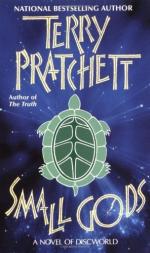|
This section contains 1,042 words (approx. 3 pages at 400 words per page) |

|
Point of View
Small Gods is written from a third-person and omniscient perspective. While most of the action follows the protagonist, Brutha, there are several scenes in which Brutha does not appear. While the focus is apt to shift between characters, the reader is only privy to one internal world at a time, with the narrative strongly influenced by the personality of the active character. Following Brutha, for example, the world seems idealized and hopeful, whereas when the story follows Om, the perspective is more cynical and jaded.
Small Gods is a highly allegorical work and clearly intended as a vehicle for humanist ideology. The work prizes reason over faith, depicting the gods as fallible, interfering, and disconnected from the cares of human beings. Instead, the narrative places higher priority on matters of day-to-day existence, such as governance, fairness and doing right by one's fellow man. While it wouldn't...
|
This section contains 1,042 words (approx. 3 pages at 400 words per page) |

|




